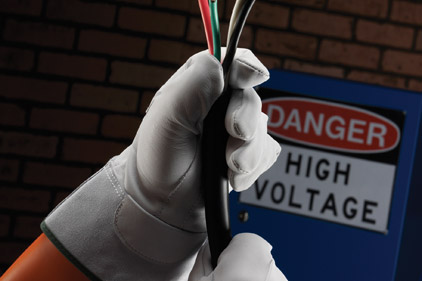OSHA 1910.132(d)(1) – The employer shall assess the workplace to determine if hazards are present, or likely to be present, which necessitates the use of personal protective equipment (PPE). If such hazards are present, or likely to be present, the employer shall:
OSHA 1910.132(d)(1)(i) – Select and have each affected employee use the types of PPE that will protect the affected employee from the hazards identified in the hazard assessment.
OSHA 1910.335(a)(1)(i) – Employees working in areas where there are potential electrical hazards shall be provided with and shall use electrical protective equipment that is appropriate for the specific parts of the body to be protected and for the work to be performed.
Get a handle on the hazards
Electrical safety begins with understanding hazards such as electrical shock and electrical arc flash. If skin comes in contact with electricity, it could be fatal. In an electrical arc flash, temperatures can reach 35,000°F, which is four times hotter than the surface of the sun. Fatal burns can occur at a distance as far as 10 feet.
Before starting a job, perform a shock hazard and arc flash analysis to establish proper boundaries. Make sure you have the proper PPE needed to complete the task, then lock out/tag out the equipment and verify the power is off. Until you confirm the power is off, it is considered live. Once those steps are completed, you can proceed with the task.
Take training to heart
Training in NFPA 70E will provide employees the knowledge in electrical shock and arc flash hazard analysis in the hazard risk category. In addition, instructions are provided for arc flash protection boundaries, how to approach energized electrical conductors and circuit parts, voltage and cal ratings and proper PPE needed to perform the specific task.
Following the electrical safety guidelines of NFPA 70E is the responsible and ethical thing to do. A lot of people think they do not need to follow the NFPA 70E procedures because they have done the same job for a long time and are careful enough day-to-day. However, unsafe conditions are present everywhere and accidents do occur. If you could speak to someone who was injured working on an electrical job, I am sure they would tell you they never thought it would happen to them. It only takes a second for a distraction to lead to injury. The cost of the proper PPE and training is minimal compared to the risk of serious injury or, worse yet, a fatality.
If you need NFPA 70E training, many consultants are available to come to your facility to train your personnel. You may also contact NFPA directly, as they offer 70E classes throughout the country.



